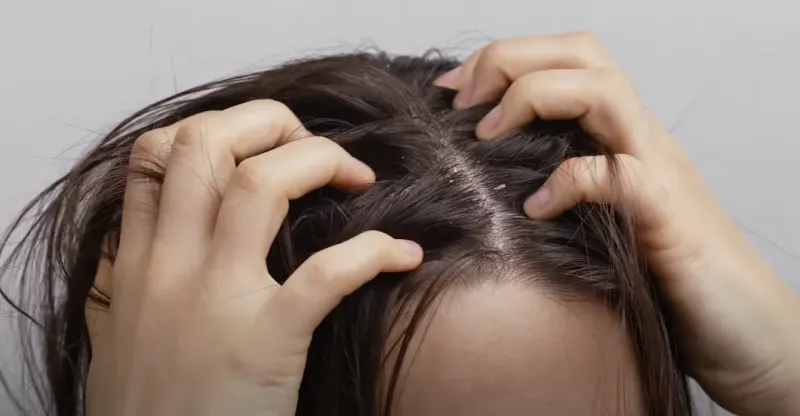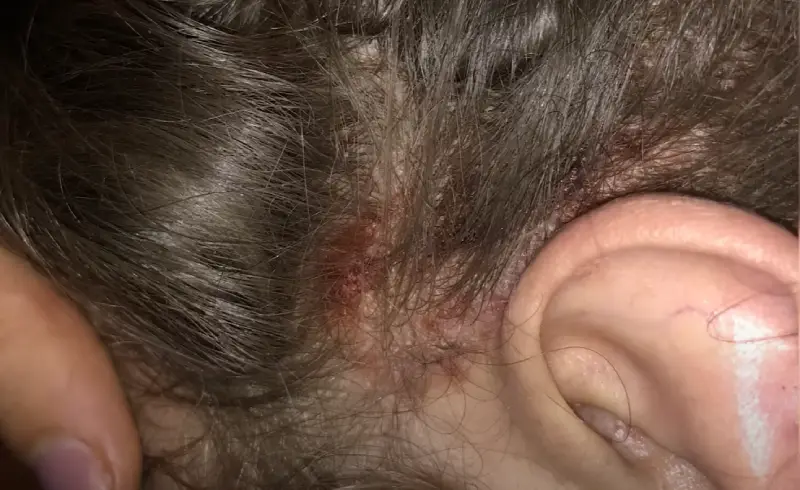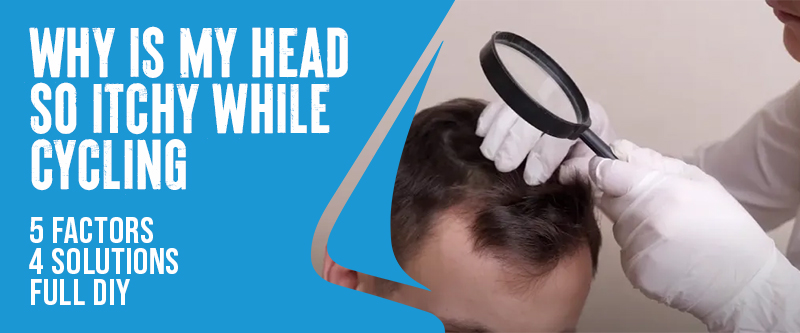Millions of bacteria are pressed to a moist scalp using your cycling helmet. Mild skin infections can go undiagnosed, leading to symptoms like hair loss, fever, rash, and secondary skin infections.
The combination of increased head temperature under the helmet and sweat creates a moist, warm environment ideal for dandruff-causing microbes to thrive.
This can lead to itchiness as these microbes exacerbate the issue, making your head feel itchier than usual during cycling.
In this blog post, we’ll delve into the sweat-soaked, allergen-ridden causes of world itchy heads in cyclists, uncovering the common causes and, most importantly, the solutions to this vexing problem.
Why Is My Head So Itchy While Cycling: 5 Main Reasons

Many factors may contribute to the itchiness you’re experiencing. Delve into the root causes of that bothersome itch on your head while cycling. Environmental allergens, dermatological conditions, and fabric sensitivities can cause head itchiness and make cycling less enjoyable. Stay tuned for tips on effectively managing and preventing these familiar sources of scalp itchiness during your rides.
Sweat and Hygiene
The benefits of cycling include staying fit and enjoying the outdoors. But have you ever wondered why your head itches so much during or after a ride? It’s not just you; many cyclists experience this. A big part of the problem relates to sweat and hygiene. The essentials are:
Sweat Accumulation Under Helmets
- Trapped Moisture: When you cycle, you sweat. Your helmet traps this sweat on your scalp. This moisture can make your head itch.
- Heat Build-Up: Helmets are great for protection but can get pretty warm. This heat makes you sweat more, adding to the issue.
Cycling Gear Washing & Cleaning
- Bacteria and Odor: Not washing your helmet or gear regularly can lead to bacteria buildup. This can lead to itching and might even lead to an unpleasant smell.
- Dirt and Grime: Sweat isn’t the only thing that accumulates. Itchy gear can also accumulate dirt and grime, contributing to itchiness.
Dermatological Conditions and Cycling

When you’re out cycling, the last thing you want is an itchy scalp distracting you. However, it’s not uncommon for cyclists to experience this annoyance. Apart from sweat and hygiene issues, underlying skin conditions like dermatitis or psoriasis can also play a significant role. Understanding these conditions and how cycling affects them is crucial for managing itchiness.
Common Skin Conditions Leading to Scalp Itchiness
- Dermatitis: This condition causes skin inflammation, leading to redness, itching, and sometimes blisters. When sweat accumulates under your helmet, it can irritate the skin further.
- Psoriasis: Psoriasis leads to the formation of red, scaly patches on the skin. These patches can be itchy and uncomfortable during physical activities.
How Cycling Exacerbates These Conditions
- Sweat Accumulation: The sweat that builds up under a helmet can irritate sensitive skin, worsening conditions like dermatitis.
- Friction: Helmets and cycling caps rubbing against the scalp can irritate areas already affected by psoriasis or dermatitis.
Environmental Allergens and Cycling
Cycling is an exhilarating way to explore the outdoors, but it can sometimes lead to an unexpected issue: a very itchy scalp. While sweat and certain skin conditions are often to blame, environmental allergens also play a big role. Pollen, dust, and other outdoor allergens can turn a pleasant ride into a scratchy nuisance. Here’s how these allergens affect you and what you can do about it.
The Influence of Outdoor Allergens
- Pollen: During spring and summer, grasses, trees, and weeds release pollen. You’re exposed to high pollen levels when you cycle through vegetation-rich areas.
- Dust: Dust particles can stick to your hair and scalp. Cycling on dirt or gravel paths increases your exposure to dust.
- Air Pollution: Although not a natural allergen, pollutants from vehicles and factories can irritate your scalp and skin.
Fabric and Material Sensitivities While Cycling
Cycling is a fantastic way to exercise and enjoy the outdoors, but an itchy head can be a frustrating downside. Believe it or not, the materials in your cycling gear and even the laundry detergent you use could be behind that bothersome itch. Here’s a deeper look into how fabric and material sensitivities affect cyclists and some tips on avoiding them.
Irritation from Helmet Materials and Laundry Detergents
- Helmet Materials: The lining inside your helmet might contain chemicals or fabrics that irritate your skin. This might be why your scalp gets itchy only while wearing the helmet.
- Laundry Detergents: Strong laundry detergent residue on cycling caps or headbands can also irritate when mixed with sweat.
Heat and Humidity: Itchy Scalp Culprits in Cycling

Ever wonder why your head itches more when cycling, especially on hot days? The answer often lies in the heat and humidity. High temperatures and moist air can make your scalp itch more than usual. Here’s why this happens and how you can keep cool and comfortable.
How Heat and Humidity Contribute to Scalp Itchiness
- Sweat Overload: In hot weather, your body sweats more to cool down, including your scalp under your helmet. This excess sweat can irritate your skin.
- Moisture Buildup: Humidity prevents sweat from evaporating quickly. This leaves your scalp damp for longer, which can lead to itchiness.
Head Itchiness While Cycling: Practical Solutions & Preventive Measures
Facing an itchy scalp during or after cycling can take the joy out of a ride. It is possible to prevent the occurrence of this uncomfortable sensation. From ensuring your helmet is well-ventilated to maintaining your gear and adopting the right haircare routines, here’s what you need to know to keep itchiness at bay.
Choosing Suitable Products
Cyclists bothered by an itchy head while riding can find relief through various products and strategies.
- Opt for Mild Formulas: Look for shampoos and conditioners designed for sensitive skin or labeled as hypoallergenic. These are gentler on your scalp.
- Avoid Heavy Products: Avoid heavy styling products that can leave a residue. Lighter products are less likely to cause buildup.
- Consider Your Needs: If you frequently go outdoors, look for UV-protective products to guard your scalp against sun damage.
- Natural Ingredients: Products with natural moisturizers like tea tree oil and aloe vera are beneficial for soothing the scalp and preventing dryness and irritation.
Tips for Preventing Itchiness from Haircare Products
Combat scalp itchiness triggered by haircare products with these impactful tips. Incorporate them into your daily haircare routine for relief.
- Rinse Thoroughly: Rinse your hair well to remove shampoo and conditioner traces.
- Limit Styling Products: Use the minimal amount of styling products necessary and choose those that are easily washed out.
- Wash After Cycling: Sweat can mix with product residue and irritate your scalp, so it’s a good idea to wash your hair after a cycling session, especially if it is sweaty.
- Patch Test: Prior to trying out a new product, perform a patch test to observe your scalp’s reaction.
Actionable Tips for Preventing Scalp Itchiness

Here are some successful strategies for effectively relieving scalp itchiness with practical tips in this guide. These strategies encompass a range of specialized products and expert recommendations to help you achieve a soothing and itch-free scalp.
- Proper Helmet Ventilation: Choose helmets that have good airflow to help keep your head cool and reduce sweat buildup.
- Regular Gear Maintenance: Clean your helmet and any headgear regularly to remove sweat, dirt, and bacteria that can cause itchiness.
- Stay Hydrated: Drinking enough water helps regulate your body temperature and can decrease the amount of sweat your scalp produces.
Consulting with a Dermatologist
While these tips can significantly reduce scalp itchiness for many cyclists, it may be time to consult a dermatologist if your scalp remains persistently itchy despite these measures. They can:
- Identify Underlying Conditions: A dermatologist can determine if a skin condition like psoriasis or dermatitis is causing your itchiness.
- Recommend Specialized Treatments: They can prescribe treatments or recommend over-the-counter solutions specifically suited to your condition.
- Personalized Advice: By analyzing your specific requirements, a dermatologist can advise tailored to your needs, helping you enjoy cycling without discomfort.
Conclusion
Dealing with an itchy scalp while cycling can put a damper on your ride, but fret not–it doesn’t have to be a recurring nuisance. Factors like sweat, hygiene, skin conditions, allergens, fabric sensitivities, and weather play a role.
Understanding these triggers can steer you toward effective solutions and preventive actions. Remember, looking after your scalp is as crucial as maintaining your gear for a smooth ride.
So, before you hit the road on your bike, arm yourself with knowledge of the right products and ensure your helmet provides ample ventilation. If the itch persists, consulting a dermatologist is essential. Let nothing come between you and the freedom of the open road.
FAQs
What Is The Average Duration Of An Itchy Head?
Experiencing nighttime scalp itchiness is known as nocturnal pruritus. This issue can be acute (curing within a few days or weeks) or chronic (extending beyond six weeks). Fluctuations in body temperature during sleep might contribute to heightened itchiness levels.


